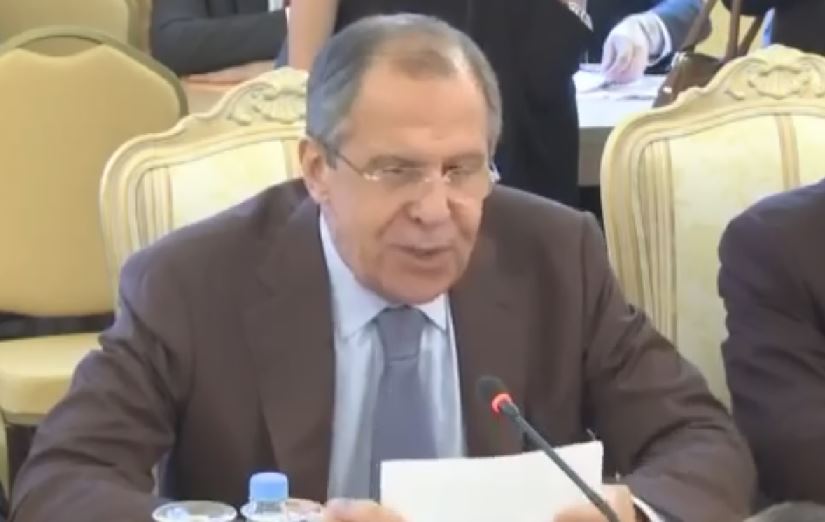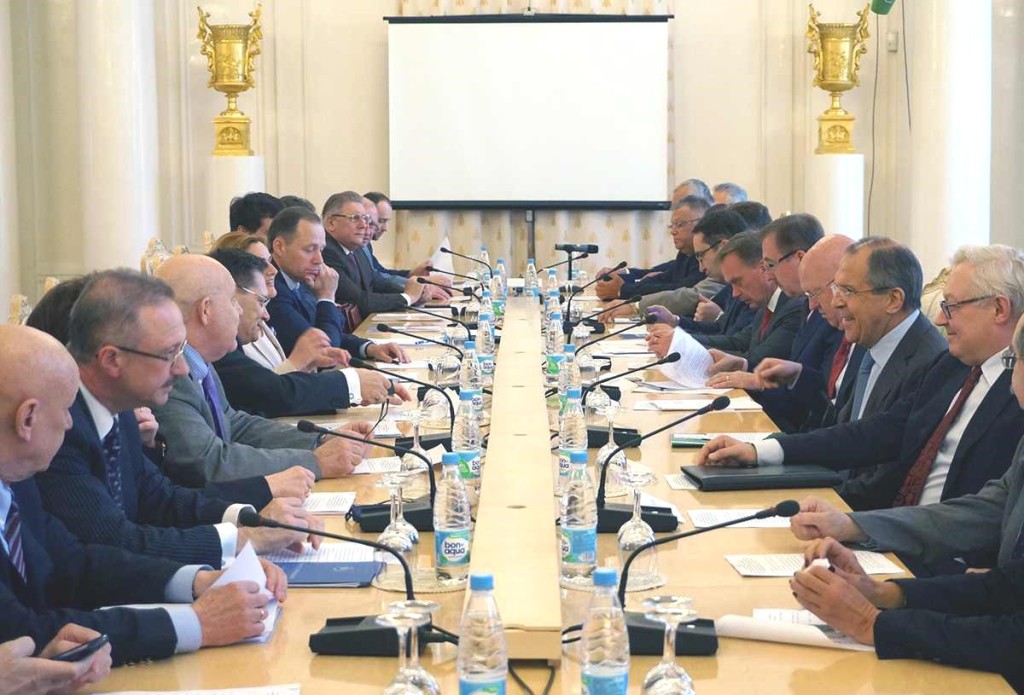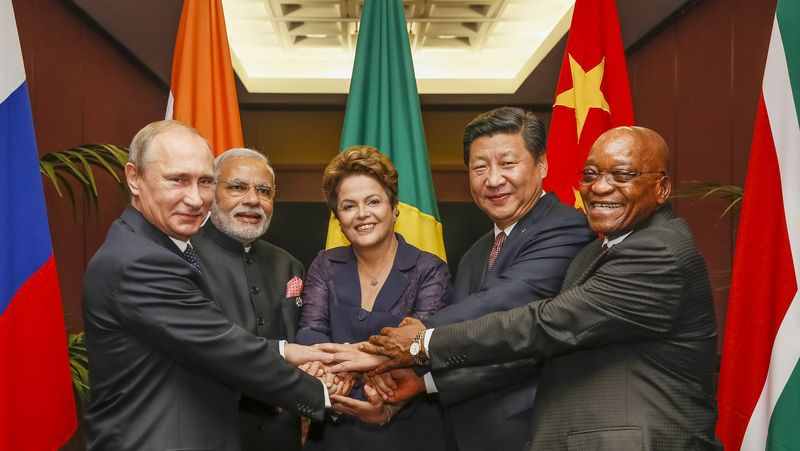
Lavrov outlines Russia’s plans for trade with Latin America
In a major address Friday (June 5), Russian Foreign Minister Sergei Viktorovich Lavrov presented to the Foreign Ministry’s Business Council a template of how Russia plans to deal with Latin America and the Caribbean in economic terms and how Russian business executives should implement that policy. The Council was to meet after the speech and develop suitable strategies, some of which are already being drafted.
Because of the significance of the subject, Progreso Weekly has translated Lavrov’s speech and publishes it below. The translator’s clarifications appear [in brackets.]

Dear colleagues,
Thank you for responding to our invitation to take part in this meeting of the Business Council, which we agreed will be devoted to the prospects of Russia’s cooperation with the countries of Latin America and the Caribbean, including the investment and technological spheres.
Our interest in this region is consistent and of a long-term nature. We stand for a strong, politically cohesive and economically stable Latin America, which is now establishing itself as one of the main pillars of the emerging multipolar world order.
We note with satisfaction that the countries of [Latin America] aim to defend the region’s rightful place in world affairs on the basis of equality, balance of interests and mutual respect. We fully support this course.
Russia does not view the region through the prism of geopolitical confrontation with anyone — neither we nor our Latin American partners are interested in that. The strengthening of mutually beneficial relations with the region in all areas is for us, of itself, sufficient value.
A few considerations before today’s debate. Practically, there is no doubt that in the future the trend will continue to strengthen and enhance the impact of the share of the Latin American region in world politics and the global economy.
It is clear that its dynamic development will take place against the backdrop of the majority of countries moving toward centrism, their commitment to a pragmatic approach, without being tied to any one ideology and leaning only toward an “elite” of allies in foreign affairs.
The potential for conflict has diminished in the region; by and large, there are no serious inter-state conflicts. On the contrary, there is an interest in working together to strengthen the overall “Latin American home” through both regional — the Community of Latin American and Caribbean States known as CELAC — and sub-regional integration.
In the latter case, the best perspective is provided by the Southern Common Market (Mercosur), the Pacific Alliance, and the Central American Integration System (SICA). There is a search for ways to utilize regional integration mechanisms to stimulate socio-economic development, including through enhanced relations with partners outside the region.
In recent years, Russia has successfully stepped up political dialogue with its Latin American partners. Our approaches to key international issues are very similar. We are solidly in favor of the strict observance of international law, the solution of any problems through multilateral negotiations while respecting the sovereignty of all States, without interference in their internal affairs, pressure or diktat.
The Latin American countries are genuinely interested in expanding and diversifying their cooperation with Russia, both bilaterally and in multilateral formats. Once again I was convinced of that during a tour of the region in March. In a number of countries — such as Argentina, Brazil, Venezuela, Cuba, Nicaragua, and Ecuador — relationships have reached or are reaching the level of a strategic partnership.

We are working closely with Brazil and the BRICS bloc [Brazil, Russia, India, China, South Africa], which is approved as an influential participant in the system of global governance. As you know, in July we will host the BRICs summit in Ufa [in Bashkortostan]. Russia is consistently strengthening the mechanism of political dialogue and cooperation with CELAC. We are developing relations with the Central American Integration System. In March we asked about becoming an extra-regional observer at SICA.
In recent years, the volume of trade remained stable at about 16 billion to 18 billion dollars. However, the range of bilateral trade remains traditional — dominated by commodities and agricultural products. The task, apparently, is to take concrete steps to address the situation in trade and economic relations with the countries of Latin America and the Caribbean. I think we should focus primarily on long-term cooperation projects in areas where Russian positions are traditionally strong in terms of their economic benefits for all participants.
It is necessary to make maximum use of the complementary nature of our nations’ economies, build integrated high-tech projects and manufacturing chains, including the most popular areas such as energy (from wide sources — oil and gas, hydro and nuclear), machinery, primarily aircraft and helicopter engineering, infrastructure and transport. Recently, there have been some interesting developments in the field of biopharmaceuticals and information technologies.
Successful examples of interaction include the construction of “technological alliances” with Argentina and Brazil, the implementation of projects in the field of peaceful nuclear energy in Argentina, and various energy projects in Venezuela and Ecuador.
Of course, there is no substitute for the establishment of direct contacts between our business communities. Good opportunities for this are the major platforms for economic discussion in Russia, including the St. Petersburg International Economic Forum. This year, it is scheduled within [the forum’s] Latin American section. I think that many of you will take active part in it.
Proven mechanisms of interaction are the intergovernmental commissions and the high-level commissions. I would consider it important to make greater use of the potential of business councils, chambers of commerce, the National Committee for Economic Cooperation with Latin American countries. Today, it would be interesting to hear the views of representatives of these institutions who are involved in this meeting. We also hope to learn firsthand more about the initiative to establish a permanent Russian-Latin American Forum. I know that you have actively promoted it.
The focus should be inter-regional cooperation. Its legal and contractual foundation has been laid down; there are concrete examples of the successful implementation of mutually beneficial projects involving Russian and Latin American regions.
An essential element of cooperation is the contact between the regional integration mechanisms and the Eurasian Economic Union (EAEC). Talks are proceeding on a draft memorandum of cooperation on trade and economic issues between the EAEC and the member countries of the Southern Common Market (Mercosur).
I think that today’s meeting will come up with new proposals and initiatives that will contribute to further enhance trade and economic relations between Russia and the countries of Latin America and the Caribbean Basin. I look forward to a lively and substantive discussion.

